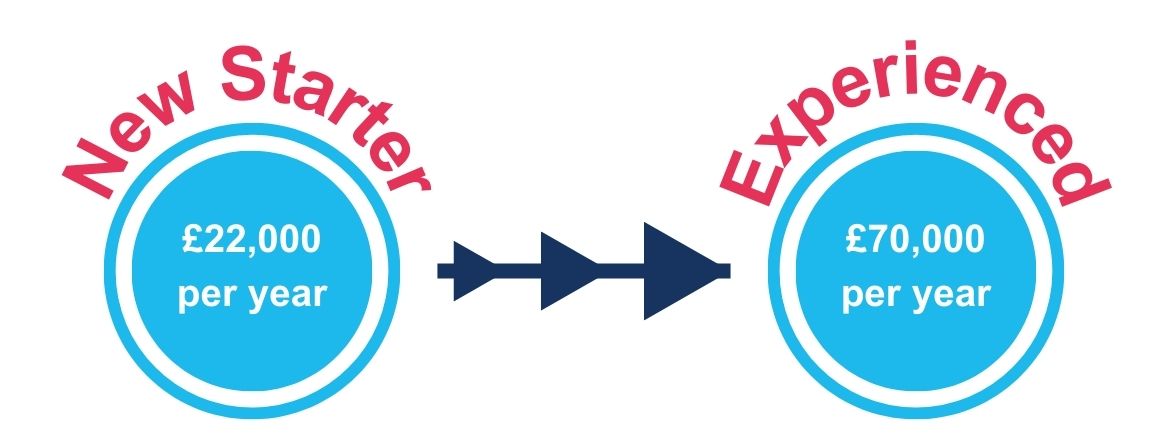Projects can be defined and delivered within different contexts, across diverse industry sectors. They can be large or small. Every project needs to be managed to ensure its success. An associate project manager knows what needs to be achieved, how it will be achieved, how long it will take and how much it will cost, and works with the project team to achieve the required outcomes.
Associate project managers need good planning, organisation, leadership, management and communication skills. An associate project manager utilises resources with suitable skills, qualifications, experience and knowledge to work together in a motivated and integrated team, with clearly defined reporting lines, roles, responsibilities and authorities.
Dependent upon the size of the organisations and the complexity of projects, associate project managers' job titles will vary, but typically they can include: assistant project manager, junior project manager, project team leader. Some organisations use 'project manager' as a generic job title.
Course Requirements
Either before or during the apprenticeship, apprentices will be required to achieve level 2 qualifications in English and Mathematics prior to taking end point assessment (EPA). Apprentices are required to achieve a suitable level of knowledge as part of their development such that they achieve an IPMA Level D qualification or APM Project Management Qualification, prior to their EPA.
- Different types of organisational structures and responsibilities, functions and project phases on different types of project
- How governance can control and manage the successful delivery of projects
- The significance of the project management plan (PMP)
- Stakeholders: their perspectives, different interests and levels of influence upon project outcomes
- Key contexts of a project communication plan, its effectiveness in managing different stakeholders
- Factors which can affect communications such as cultural and physical barriers
- The vision and values of the project and its links to objectives; the ways in which these can be effectively communicated and reinforced to team members and stakeholders
- Leadership styles, qualities and the importance of motivation on team performance
- Characteristics of the working environment which encourage and sustain high performance
- Purpose and formats for consolidated plans to support overall management, taking account of lessons learnt and how the plans balance fundamental components of scope, schedule, resources, budgets, risks and quality requirements
- Funding, estimating, overheads; direct costs, indirect costs, fixed costs, variable costs and an overall budget for a project; tracking systems for actual costs, accruals and committed costs; alternative cost breakdowns to provide for graphical representations, and performance management
- Preparation and/or maintenance of business cases, including benefits management
- Requirements management, and evaluation of alternative methods to learn from the past to improve delivery
- Project scope change control, baseline change management, configuration management
- Scheduling and estimating for project activities including how they can be quality assessed
- Progress monitoring and metrics to assess work performed against the schedule
- Schedule management methods to evaluate and revise activities to improve confidence in delivery
- Resource analysis, resource allocation and resource acceptance
- The need for and implementation of a risk management plan
- Risk management methods and techniques to identify and prioritise threats or opportunities
- Mitigation actions to minimise risk impacts and to optimise benefits by managing opportunities
- The nature of contracts, and their implications for contracting organisations
- Procurement processes. Legal and ethical means for managing contracts
- Quality management processes, assurance and improvements
- Outcomes of a quality management plan, metrics for processes and quality standards
- The different contexts in which projects can be delivered, including health, safety, and environment management
- The interdependencies between project(s), programme(s) and portfolio management
- Project phases and key review points, across project life cycles
- Skilled in the use of multiple IT packages and systems relevant to the organisation in order to: write letters or emails, create proposals, perform financial processes, record and analyse data
- Examples include MS Office or equivalent packages
- Able to choose the most appropriate IT solution to suit the business problem
- Able to update and review databases, record information and produce data analysis where required
- Produces accurate records and documents including: emails, letters, files, payments, reports and proposals
- Makes recommendations for improvements and present solutions to management
- Drafts correspondence, writes reports and able to review others' work
- Maintains records and files, handles confidential information in compliance with the organisation's procedures
- Coaches others in the processes required to complete these tasks
- Exercises proactivity and good judgement
- Makes effective decisions based on sound reasoning and is able to deal with challenges in a mature way
- Seeks advice of more experienced team members when appropriate
- Builds and maintains positive relationships within their own team and across the organisation
- Demonstrates ability to influence and challenge appropriately
- Becomes a role model to peers and team members, developing coaching skills as they gain area knowledge
- Demonstrates good communication skills, whether face-to-face, on the telephone, in writing or on digital platforms
- Uses the most appropriate channels to communicate effectively
- Demonstrates agility and confidence in communications, carrying authority appropriately
- Understands and applies social media solutions appropriately
- Answers questions from inside and outside of the organisation, representing the organisation or department
- Completes tasks to a high standard
- Demonstrates the necessary level of expertise required to complete tasks and applies themself to continuously improve their work
- Is able to review processes autonomously and make suggestions for improvements
- Shares administrative best-practice across the organisation e.g. coaches others to perform tasks correctly
- Applies problem-solving skills to resolve challenging or complex complaints and is a key point of contact for addressing issues
- Takes responsibility for initiating and completing tasks, manages priorities and time in order to successfully meet deadlines
- Positively manages the expectations of colleagues at all levels and sets a positive example for others in the workplace
- Makes suggestions for improvements to working practice, showing understanding of implications beyond the immediate environment (e.g. impact on clients, suppliers, other parts of the organisation)
- Manages resources e.g. equipment or facilities
- Organises meetings and events, takes minutes during meetings and creates action logs as appropriate
- Takes responsibility for logistics e.g. travel and accommodation
- Uses relevant project management principles and tools to scope, plan, monitor and report
- Plans required resources to successfully deliver projects
- Undertakes and leads projects as and when required
- Behaves in a professional way
- This includes: personal presentation, respect, respecting and encouraging diversity to cater for wider audiences, punctuality and attitude to colleagues, customers and key stakeholders
- Adheres to the organisation's code of conduct for professional use of social media
- Acts as a role model, contributing to team cohesion and productivity – representing the positive aspects of team culture and respectfully challenging inappropriate prevailing cultures
- Shows exemplary qualities that are valued including integrity, reliability, self-motivation, being pro-active and a positive attitude
- Motivates others where responsibility is shared
- Takes responsibility for their own work, accepts feedback in a positive way, uses initiative and shows resilience
- Also takes responsibility for their own development, knows when to ask questions to complete a task and informs their line manager when a task is complete
- Performs thorough self-assessments of their work and complies with the organisation's procedures
- Is able to accept and deal with changing priorities related to both their own work and to the organisation
- Demonstrates taking responsibility for team performance and quality of projects delivered
- Takes a clear interest in seeing that projects are successfully completed and customer requests handled appropriately
- Takes initiative to develop own and others' skills and behaviours
Assessment Methods
This is a knowledge based course with practical aspects that will need to be demonstrated.
End-Point Assessment
- Written project report with presentation and questioning
- Professional discussion underpinned by a portfolio of evidence
Progression Routes
Upon the successful completion of this apprenticeship, why not continue to study this course:
This apprenticeship aligns with Association for Project Management for Associate Membership
(Please contact the professional body for details)




